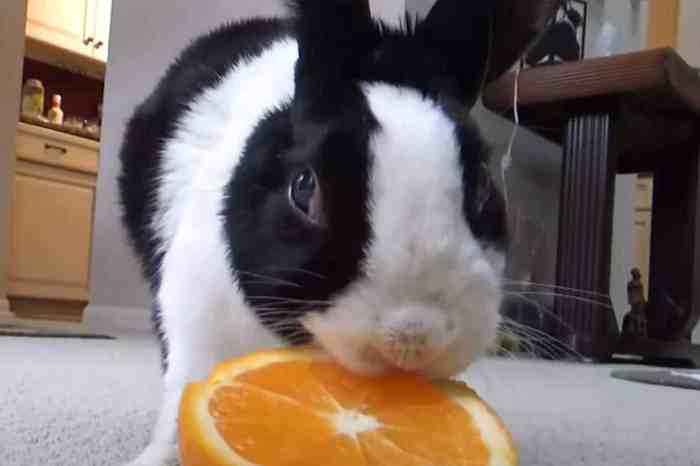The question of whether rabbits can eat oranges is a common one among rabbit owners. While oranges are a nutritious fruit for humans, their high sugar content and potential for digestive issues raise concerns about their suitability for rabbits.
In this article, we will explore the nutritional value of oranges, the potential risks associated with feeding them to rabbits, and safe feeding guidelines. We will also discuss alternative sources of vitamin C for rabbits and provide answers to frequently asked questions.
Nutritional Value of Oranges
Oranges are a nutrient-rich fruit that offers various health benefits for rabbits. They are a good source of vitamins, minerals, and fiber, all of which are essential for maintaining optimal health.
The following table provides a detailed breakdown of the nutritional value of oranges per 100 grams:
| Nutrient | Amount |
|---|---|
| Vitamin C | 53.2 mg |
| Potassium | 181 mg |
| Fiber | 2.4 g |
| Calcium | 52 mg |
| Magnesium | 12 mg |
| Phosphorus | 20 mg |
These nutrients play a vital role in rabbits’ health. Vitamin C, for instance, is essential for immune function and collagen production. Potassium helps regulate blood pressure and muscle function, while fiber aids in digestion and prevents gastrointestinal issues. Calcium and phosphorus are important for bone and teeth health, and magnesium supports energy production and nerve function.
Potential Risks of Feeding Oranges to Rabbits
Feeding oranges to rabbits can pose certain risks due to their digestive sensitivities and high sugar content.
Digestive Issues
Oranges contain a significant amount of fiber, which can be beneficial for rabbits in small amounts. However, excessive fiber intake can lead to digestive upset, including diarrhea, bloating, and gas. Additionally, the acidity of oranges can irritate a rabbit’s sensitive digestive system, causing stomach discomfort.
Sugar Content
Oranges are also high in natural sugars, which can be harmful to rabbits. Excessive sugar consumption can lead to weight gain, dental problems, and even diabetes in the long term. Furthermore, the sudden influx of sugar can cause an upset stomach and contribute to digestive issues.
Safe Feeding Guidelines
To ensure the well-being of your rabbit, it’s crucial to adhere to these guidelines when feeding oranges:
Recommended Amounts: Limit orange consumption to small pieces, approximately the size of a rabbit’s thumbnail, no more than once or twice a week.
Gradual Introduction
Introduce oranges gradually to your rabbit’s diet. Start with a tiny piece and observe for any adverse reactions. If none occur, you can gradually increase the amount.
Monitoring
Monitor your rabbit closely after feeding them oranges. Watch for signs of digestive upset, such as diarrhea or vomiting. If any adverse reactions occur, discontinue orange feeding and consult your veterinarian.
Alternative Sources of Vitamin C for Rabbits
Rabbits cannot synthesize their own vitamin C, so it is essential to provide them with dietary sources of this nutrient. While oranges are a good source of vitamin C, there are several other fruits and vegetables that are also rich in this vitamin and may be more suitable for rabbits.
Leafy Greens
Leafy greens such as romaine lettuce, spinach, and kale are excellent sources of vitamin C. They are also low in calories and high in fiber, making them a healthy addition to a rabbit’s diet.
Bell Peppers
Bell peppers, especially red bell peppers, are another good source of vitamin C for rabbits. They are also a good source of vitamin A and potassium.
Comparison of Vitamin C Content
The following table compares the vitamin C content of oranges, leafy greens, and bell peppers:| Food | Vitamin C Content (mg/100g) ||—|—|| Oranges | 53.2 || Romaine lettuce | 13.3 || Spinach | 28.1 || Kale | 93.3 || Red bell pepper | 120.0 |As you can see, leafy greens and bell peppers are comparable to oranges in terms of vitamin C content, and some, like kale and red bell peppers, are even richer in this nutrient.
Therefore, these foods can be excellent alternatives to oranges for providing rabbits with the vitamin C they need.
Conclusion

In conclusion, feeding oranges to rabbits requires careful consideration and moderation. Oranges provide essential vitamin C, but excessive consumption can lead to health complications. It’s crucial to adhere to the safe feeding guidelines discussed earlier and consult with a veterinarian for personalized advice based on your rabbit’s individual needs.
Remember, responsible feeding practices ensure the well-being and longevity of your beloved companion.
Last Recap
In conclusion, while oranges can be a treat for rabbits in moderation, it is crucial to prioritize responsible feeding practices. Gradual introduction, monitoring for adverse reactions, and consulting with a veterinarian are essential for ensuring the well-being of your rabbit.
By following these guidelines and exploring alternative sources of vitamin C, you can provide your furry friend with a healthy and balanced diet.
Common Queries
Can rabbits eat orange peels?
No, orange peels are not safe for rabbits. They contain a compound called psoralen, which can cause skin irritation and gastrointestinal upset.
How often can I give my rabbit an orange?
As a treat, you can offer your rabbit a small piece of orange once or twice a week.
What are good alternatives to oranges for rabbits?
Good alternatives to oranges for rabbits include leafy greens (such as romaine lettuce, spinach, and kale), bell peppers, and parsley.